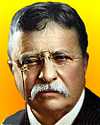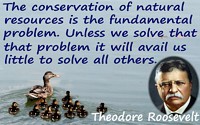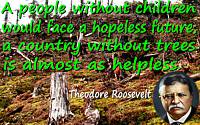 (source)
(source)
|
Theodore Roosevelt
(27 Oct 1858 - 6 Jan 1919)
American president and conservationist (26th, 1901-09) whose term included efforts to conserve national resources, especially the passage of the Newlands Reclamation Act (1902). He was the first president to ride in an automobile (1902), go underwater in a submarine (1905), or fly in an airplane (1910). Immediately after leaving his presidency, he undertook a safari to Africa as hunter and naturalist. In 1913, he travelled on a scientific expedition to the interior of Brazil which produced geographic, geological, and zoological information, and almost two thousand specimens of birds and mammals were collected for the American Museum of Natural Science.
|
Roosevelt, the Man of Abundant Life1
By GIFFORD PINCHOT
from Natural History (1919)
[p.17] WE who loved Roosevelt have not lost him. The qualities we treasured in him, his loyalty, his genial kindness, his unwearied thoughtfulness for others, the generosity which made him prefer his friends in honor to himself, his tenderness with children, his quick delight in living, and the firm soundness of his life’s foundations, are potent with us yet. The broad human sympathy which bound to him the millions who never saw his face, his clean courage and self-forgetful devotion to his country, the tremendous sanity of his grasp on the problems of the nation and the world, and the superb simplicity and directness of his life and thought still live as the inspiration and the basis for the new and better world which is to come.
The people loved Roosevelt because he was like them. In him the common qualities were lifted to a higher tension and a greater power, but they were still the same. What he did plain men understood and would have liked to do. The people loved him because his thoughts, though loftier, were yet within their reach, and his motives were always clear in their sight. They knew his purposes were always right. To millions he was the image of their better selves.
Roosevelt was the greatest preacher of righteousness in modern times. Deeply religious beneath the surface, he made right living seem the natural thing, and there was no man beyond the reach of his preaching and example. In the sight of all men, he lived the things he taught, and millions followed him because he was the clear exemplar of his teaching.
Unless we may except his Conservation Policies2 Roosevelt’s greatest service during his presidency was the inspiration he gave young men. To them he was the leader in all they hoped to be and do for the common good. The generation which was entering manhood while he was President will carry with it to the grave the impress of his leadership and personality.
To the boys of America he was all they hoped to be—a hunter, a rider, a sportsman, eager for the tang of danger, keen and confident, and utterly unafraid. There was no part of his example but was good for boys to follow. Roosevelt, half boy till his life’s end, yet the manliest of men, of a fineness his best friends best understood, was their ideal, and will not cease to be because he has passed on.
To him the unforgivable sin, and there was but one, was betrayal of the interests of his country. The man who [p.18] sinned that sin he neither forgave nor forgot. For opposition to himself he cared but little; enemies he had in plenty, but they cast no shadow on his soul. He was a gallant and a cheerful fighter, willing, as he often said, to be beaten for any cause that was worth fighting for, and whether in defeat or victory, never unbalanced and never dismayed.
Roosevelt lived intensely in his family life. The doer of great things himself, and the occasion of great accomplishment in others, what he did was not done alone. It is but right that we should recognize the part played by the strong and gentle, wise and loving woman, whose hand was so rarely seen yet still more rarely absent in all that was best in her great husband’s finest living and most memorable achievements.
The greatest of executives, he transformed the machinery of government with the flame of his own spirit. He was his own hardest taskmaster, and always unwilling to ask of his men the thing he was not ready to do himself. He was our leader because he was the better man. He worked more hours, at higher speed, with wider vision. he trusted us, and gave each man his head. Always eager to recognize good work and give due credit for it, always ready with an excuse for the man who honestly tried and failed, he had nothing but scorn and contempt for the man who never tried at all.
Filled with the joy and the spice of living, afraid neither of life nor of death, thankful for sunshine or rain, never sorry for himself, never asking odds of any man or any situation, he used the powers he had as only his great soul could use them—powers seldom if ever before assembled in one individual, but nearly all of them duplicated, one here, one there, within the knowledge of us all. It was the use his soul made of his body and his mind that was the essence of his greatness.
The greatest of his victories was his last, his victory over the indifference of a people long misled. He was the first to see the need for it. To gain it he seemed to throw away his future. In the event he won results and earned a name which will live while the knowledge of America’s part in the Great War still endures.
He was the leader of the people because his courage and his soundness made him so. More than any man of his time, he was loved by those who ought to love him, and hated by those who ought to hate him. His ideals, his purposes, his points of view, his hostilities, and his enthusiasms were such as every man could entertain and understand. It was only in the application of them that he rose to heights beyond the reach of all the rest of us.
What explains his power? Life is the answer. Life at its warmest and fullest and freest, at its utmost in vigor, at its sanest in purpose and restraint, at its cleanest and clearest,— life tremendous in volume, unbounded in scope, yet controlled and guided with a disciplined power which made him, as few men have ever been, the captain of his soul. Alert, glad, without meanness and without fear, free from arrogance and affectation, with few hesitations and few regrets, slow to promise but ardent to perform, delighting in difficulties, welcoming danger, sensitive to the touch of every phase of human existence, yet dominated by standards more severely set for himself than for any others, sustained by a breadth of knowledge and of sympathy and by an endurance, both physical and mental, which belonged to him alone, Roosevelt lived with a completeness that lesser men can never know.
In Roosevelt above all the men of his time, the promise of the Master was fulfilled—“I came that ye might have life, and that ye might have it more abundantly.”
2 The name of Gifford Pinchot is closely connected with the work in conservation accomplished by Roosevelt, who states the high value he placed on Mr. Pinchot’s services in the chapter on “The Natural Resources of the Nation” in his Autobiography (p. 429):
“Gifford Pinchot is the man to whom the nation owes most for what has been accomplished as regards the preservation of the natural resources of our country. He led, and indeed, during its most vital period embodied, the fight for the preservation through use of our forests. He played one of the leading parts in the effort to make the national Government the chief instrument in developing the irrigation of the arid West. . . .”
The story of the forestry work of the Roosevelt administration is one of great historical interest. It includes the training of foresters at a newly opened forest school at Yale, the development of our present Forest Service with trained foresters in control of the public lands, the great increase by Executive Order of the area of the national forests, and their opening to settlers under regulation, the calling of the first meeting of governors in this country (May, 1908), and the appointment of a National Conservation Commission with the purpose of making an inventory of all the resources of the nation, Gifford Pinchot was chairman of this commission. All of this work from 1901 to 1909 formed the basis of the country’s present practical enlightenment on conservation.—The Editor.
- Science Quotes by Theodore Roosevelt.
- Theodore Roosevelt - memorialized as a Naturalist in a tribute by John Burroughs in Natural History magazine (1919)
- Theodore Roosevelt, Naturalist - memorial tribute by Henry Fairfield Osborn in Natural History magazine (1919)
- Theodore Roosevelt - Friend of Man - memorial tribute by Robert Peary in Natural History magazine (1919)
- Theodore Roosevelt and Africa - memorial tribute by Carl Akeley in Natural History magazine (1919)
- Personal Glimpses of Theodore Roosevelt - memorial tribute by David Starr Jordan in Natural History Magazine (1919).
- Theodore Roosevelt - context of his “A Country Without Trees” quote - Medium image (500 x 350 px).
- Theodore Roosevelt - context of his “Conservation of natural resources is the fundamental problem” quote - Medium image (500 x 350 px)
- Theodore Roosevelt - context of his “A Country Without Trees” quote - Large image (800 x 600 px).
- Theodore Roosevelt - context of his “Conservation of natural resources is the fundamental problem” quote - Large image (800 x 600 px)
- The Wilderness Warrior: Theodore Roosevelt and the Crusade for America, by Douglas Brinkley. - book suggestion.
- Booklist for Theodore Roosevelt.






